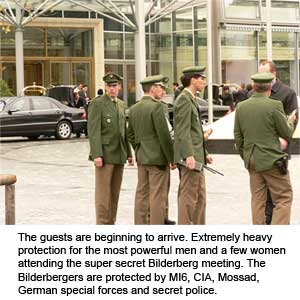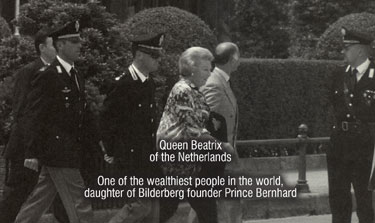Subscribe to ShahidulNews
Conspiracy theory, or global power structure?
By rahnuma ahmed
Speculation about the Bilderberg Group runs rife at both ends of the political spectrum ? ‘Bilderberg meetings are a corporate-globalist scheme planning to move the planet toward an oligarchic new world order.’ ‘The Republican Party (US) is secretly controlled by elitist intellectuals who are dominated by the Bilderberg Group, their internationalist policies will pave the way for world communism.’ ‘It is a secret cabal that runs the world.’ ‘Presidents and prime ministers are selected by the Bilderberg.’
It is secret. It is conspiratorial. It runs the world.
Thierry Meyssan of the Voltaire Network International, a web of non-aligned press groups dedicated to the analysis of international relations, blames ‘journalistic hacks’ (he names Alex Jones and Jim Tucker) for making millions of people around the world believe that the Bilderberg Group is not only a secret conspiratorial group that runs the world, but selects presidents and prime ministers so that they can execute the Group’s political and economic agenda (What you don’t know about the Bilderberg Group, May 9, 2011).
Whereas, the Bilderberger Conference is actually ‘nothing more than a? propaganda organisation to prop up and give legitimacy to NATO’ (North Atlantic Treaty Organisation).
But the comfort some readers may hastily derive from reading that it is ‘nothing more than a propaganda organisation’, that the Bilderberg Group is not — contrary to the idea developed by ‘creative journalists’ — working to forge a ‘secret World Government’, will hardly be sustained after reading what Meyssan goes on to write: ‘It is in fact much more serious and dangerous, because it is NATO which aims to be the secret World Government – guaranteeing the international status quo and maintaining U.S. influence.’
Meyssan claims to have been the only journalist who has had access to their archives, to all records for the period 1954-1966, many later day documents as well, in addition to having had the benefit of speaking to a former participant whom he had known for long. Unlike those journalists, who, he says, have helped to construct a stereotypical image of the Bilderberg ? a secret cabal, new world order — popular in many western activist circles.
Meyssan argues that the idea of the Bilderberg Group conspiring to create ‘a mysterious future World Government’ is misleading. It serves to mask their true function and identity, i.e., lobbying for NATO’s interests which is served by setting up a secret world government to maintain the international status quo and US influence.

G. William Domhoff, professor of Psychology and Sociology at the University of California, author, Who Rules America. Power, Politics and Social Change (1967), Who Rules America Now? (1983), when asked about the difference between ‘conspiracism’ and criticism of the status quo based on ‘power structure research’, speaks of things worth dwelling on (New Internationalist, interview with Chip Berlet, September 2004).
Elites work hard to develop consensus and this can be studied in detail ‘through such publicly observable organizations as corporate boards and the policy-planning network’ which are ‘reported in the media in at least a halfway accurate manner.’ This is the opposite of ‘a small, secretive, illegitimate conspiracy because this large group called the power elite is known to the public’. It ‘clearly states its aims (profit, profit, and more profit, and less government), publishes its policy suggestions, and is seen as legitimate by a great majority of the public.’
For the last hundred years, elites in the United States and other democracies have agreed that the manner for settling issues on which they cannot arrive at a consensus is through elections, these are ‘also public and legitimate.’ They can be observed by researchers, campaign funds can be scrutinised, these are reported in the media. Rival elites have in effect agreed to not be violent and war with each other, the last time the American elites did so was during the bloody Civil War. Historically speaking, elites have come to ‘settlements’ or ‘pacts’ that lead to elections, but this, says Domhoff, is not ‘through conspiring…but through sitting down to talk in frustration and exhaustion, usually after fighting each other to a draw over decades.’
Plotting and planning to advance one’s own interest is something we all do in everyday life, he says. Governments discuss and plan about issues which their populace know nothing about, these are often discovered by the media or elite opponents, leading sometimes to prosecutions. But these are not conspiracies. The problem with conspiracy theorists is that they take these ‘everyday machinations as evidence for some grand conspiracy at the societal and historical levels.’
Contrary to conspiracy theories, power structure research studies ‘visible institutions, take[s] most of what elites say as statements of their values and intentions, and recognize[s] that elites sometimes have to compromise, and sometimes lose.’? Conspiracists allege ‘behind the scenes groups.’ They think that everything elites say is a ‘trick’. Conspiracy theories can never be falsified (‘Its proponents always find a way to claim the elite really won’). Conspiracism is a disaster for progressive people, says Domhoff, because it leads to ‘cynicism’ and ‘convoluted thinking’. To hopelessness, even though conspirators are denounced.
I think Domhoff’s words help contextualise what the British Labour politician Denis Healey, secretary of state for defence (1964-1970), chancellor of the exchequer (1974-1979), a member of the Bilderberg Steering Committee for 30 years, said when asked about the Bilderberg:
‘To say we were striving for a one-world government is exaggerated, but not wholly unfair. Those of us in Bilderberg felt we couldn’t go on forever fighting one another for nothing and killing people and rendering millions homeless. So we felt that a single community throughout the world would be a good thing… Bilderberg is a way of bringing together politicians, industrialists, financiers and journalists. Politics should involve people who aren’t politicians. We make a point of getting along younger politicians who are obviously rising, to bring them together with financiers and industrialists who offer them wise words. It increases the chance of having a sensible global policy.’ (Jon Ronson, Who pulls the strings? (part 2), The Guardian, 10 March 2001).
It should be obvious that ‘those of us in Bilderberg’ excludes the working class. The marginalised. People of the Third World. In other words, the majority of the world’s people. Innumerable numbers killed. Millions made homeless.
The original intention of the Bilderberg Group was ‘to link governments and economies in Europe and North America amid the Cold War.’ Top European elites worked with American elites in the 1950s to form the Group in ‘an effort to bring together the most influential people from both sides of the Atlantic to advance the cause of ‘Atlanticism’ and ‘globalism” (Andrew Gavin Marshall, Bilderberg 2011: The Rockefeller World Order and the ‘High Priests of Globalization’,? Global Research, June 16, 2011).
A bringing together that Daniel Estulin, who has investigated and researched the Group for nearly two decades (author, The True Story of the Bilderberg Club, new edition 2009), calls, the creation of ‘an Aristocracy of purpose between Europe and the United States.’ ?(Stephen Lendman, A Review of Daniel Estulin’s Book, Global Research, June 1, 2009). http://www.globalresearch.ca/index.php?context=va&aid=13808 To reach consensus to rule the world on matters of policy, economics, and overall strategy. NATO was essential to implement these plans, to ensure ‘perpetual war and nuclear blackmail’ as, and when, necessary. And, ‘to proceed to loot the planet, achieve fabulous wealth and power, and crush all challengers’ in order to maintain and perpetuate their wealth and power.
The first Bilderberg meeting, held in 1954, was financed by the Central Intelligence Agency (CIA). Its European founders included Joseph Retinger, political aide to general Sikorski, and Prince Bernhard of the Netherlands. The latter had been a member of the Nazi Party until 1934; he had also worked for the German industrial giant, I. G. Farben, the maker of Zyklon B, the gas used in concentration camps to exterminate Jews. The American founders of the Bilderberg Group included billionaire David Rockefeller, Dean Rusk (top official with the Council on Foreign Relations, the CFR, Rusk was also the head of the Rockefeller Foundation), Joseph Johnson (another CFR leader, then head of the Carnegie Endowment), and John J. McCloy (another top CFR leader, chairman of Chase Manhattan Bank, also, chairman of the Board of the Ford Foundation).
It is no mere coincidence, writes Andrew Marshall,? that the major American foundations were so ‘pivotal’ in the origins of the Group.
Retinger’s main aim, says Daniel Estulin, was to unite the world in peace. ‘His peace dividend was to be under the control of supranational, powerful organisations. He believed that such organisations would be immune from short-term ideological conflicts erupting between governments. To Retinger, it was insignificant what dominated the economic ideology of a country. He believed these differences could be brought into line by powerful multinational organisations dictating and applying powerful economic and military policies, thereby creating a union and a bond between the nations.’ (Interview by Geoff Matthews, Kingston Eye Opener November-December 2005).
Prince Bernhard, maintains Estulin, was the ‘poster boy,’ a pretty face and facade.
The Bilderberg is the world’s ‘most exclusive club’, no one can buy their way in. Only the Group’s Steering Committee decides who to invite. According to the Committee’s rules:? ‘the invited guests must come alone; no wives, girlfriends, husbands or boyfriends. Personal assistants (meaning security, bodyguards, CIA or other secret service protectors) cannot attend the conference and must eat in a separate hall. (Also) The guests are explicitly forbidden from giving interviews to journalists’ or reveal anything that goes on in meetings. The overall security, aimed at not letting outsiders intrude, is provided by host governments. Membership consists of those who attend annually — ‘around 80 of the world’s most powerful’ — and others, who are invited occasionally because they are knowledgeable or involved in topics that are relevant. ‘Those most valued are asked back, and some first-timers are chosen for their possible later usefulness.’? The membership represents a ‘who’s who of world power elites, mostly from America, Canada, and Western Europe with familiar names like David Rockefeller, Henry Kissinger, Bill Clinton, Gordon Brown, Angela Merkel, Alan Greenspan, Ben Bernanke, Larry Summers, Tim Geithner, Lloyd Blankfein, George Soros, Donald Rumsfeld, Rupert Murdoch, other heads of state, influential senators, congressmen and parliamentarians, Pentagon and NATO brass, members of European royalty, selected media figures, and invited others – some quietly by some accounts like Barack Obama and many of his top officials.’
I looked up Bilderberg’s official website and discovered that since its inception in 1954, the number of annual meetings held till now total 59: in NATO member countries: United States 9, Canada ?5, France 5, W. Germany/FRG 5, United Kingdom 5, Italy 4, Turkey 3, Belgium 2, Denmark 2, Greece 2, Spain ?2. Netherlands 1, Norway 1, Portugal 1. And, in non-NATO countries: Switzerland 5, Sweden 4, Austria 2, Finland 1.
(Bilderberg meetings were held twice a year in 1955 and 1957, none in 1976).
In the more-than-half a century since the ‘most powerful men in the world’ had met in Oosterbeek, Netherlands in 1954 to ‘debate the future of the world’, the Bilderberg Group has become, ‘a shadow world government’, says Estulin. One that seeks to supplant individual nation-state sovereignty with an all-powerful global government, corporate controlled, and check-mated by military enforcement. Highly undemocratic, to say the least.
The unification of Europe is an important part of the globalisation/global power structure’s? story. As the head of Fiat Giovanni Agnelli put it, ‘European integration is our goal and where the politicians have failed, we, the old world elite, intend to succeed.’ Corroborated by George McGhee, former US ambassador to Germany, who said, ‘the Treaty of Rome, which brought the Common Market into being was nurtured at the Bilderberg meetings.’
It is a story which deserves to be told separately, in great detail, which means I cannot conclude today as promised. Hopefully, New Age will oblige.
[Concluding part to be published tomorrow]
Published in New Age, Tuesday, November 22, 2011
This is a brushed-up, typos-corrected version






Leave a Reply
You must be logged in to post a comment.